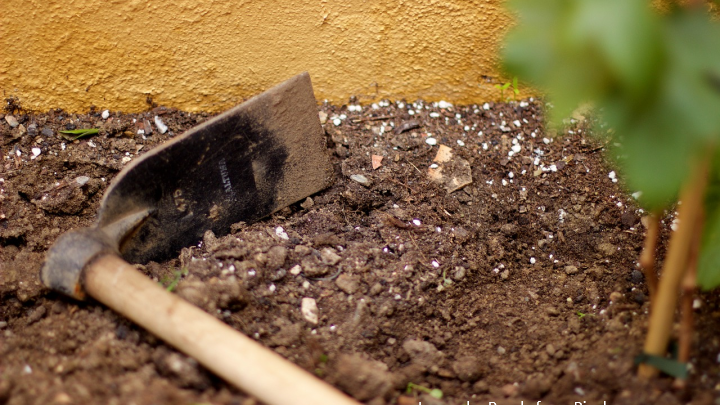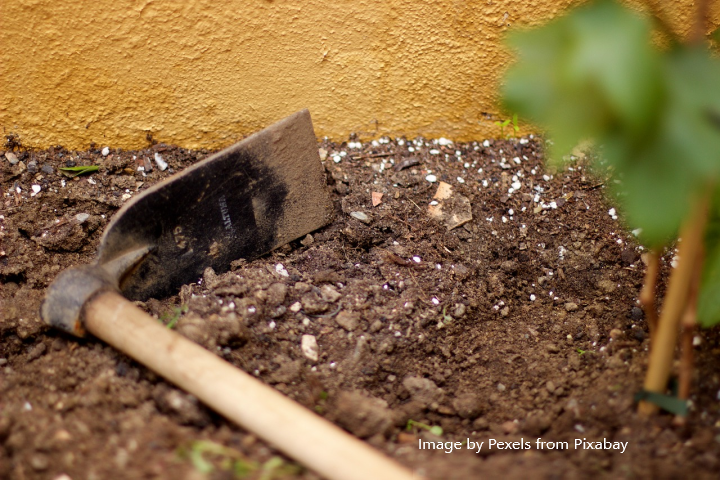I probably shouldn’t ask you that question! And yet. . . I was intrigued this week as I was listening to a report on a program to determine soil health. Farmers in various places around the world were challenged to wash a pair of new “tighty whities” (all cotton men’s underwear) and soil their undies – that is, to bury them in about 4 inches of soil and mark them with a flag. After 60 days, dig up the underwear and all that should be left is the stretchy waistband and the stitching material! The less material left, the healthier the soil. The farmers compared their results, bragging on whose undies were the smallest!
Now, the challenge has been issued to citizens within states, cities, and countries around the world. It’s a great project for school children, to help them to learn about the importance of soil and making/keeping it healthy. As I was listening to this program, I began to think about how important soil is, not only to our farmers, but the whole world. I need to be mindful of the importance of soil health, too! Like our oceans, the soil is indicative of what is going on in the world – are we littering or keeping things clean? Are we using harsh chemicals or being mindful that what we pour down our drains has to go somewhere! What will this mean for our children and grandchildren? Just how well are we treating the Earth?
Some of you may recognize the need to think more deeply about the Earth, God’s creation, as people of faith. We have the opportunity now, each fall, to address Creation Care as a “liturgical season” – it is tucked into the end of the Season after Pentecost (early September through early October). The scriptures and themes of this season remind us of God as creator, the creation reflecting God’s image, how we are called to tending the Earth and all of creation, and ways our congregations can operate in environmentally friendly ways. This season offers great opportunities for preaching a fresh word about creation AND connecting God’s word to practices which protect and care for the natural world around us. We can affect the world in a positive way with simple changes and caring actions!
In Psalm 1, we read “Happy are those who . . . delight is in the law of the Lord . . . They are like trees planted by streams of water, which yield their fruit in its season, and their leaves do not wither. In all that they do, they prosper.” (parts of verses 1-3) A believer, a disciple, someone who follows the Lord is someone who is like a tree, a healthy tree, with plenty of water, who bears fruit, who prospers. This is the kind of healthy, wonderful life we want for all people. We want people to find a good place beside a stream and who bear fruit. As Christians, we long to be in this place of prosperity, a place where we can serve well, offering faith and bearing witness to others by our words and actions. And yet, trees need lots of water and good soil so that they can thrive. If the soil is too rocky or doesn’t have minerals and organisms to constantly improve its health, then the tree may not thrive.
Let me back up. I did a little bit of research about soil and found that it is composed of five “things”: minerals, dead and living organisms, air and water. These four ingredients interact with one another to make a wonderful, always changing resource. It takes a long time, but soil is constantly being formed through the interaction of ingredients and the weather or climate in which they exist. So, if we go with the tree metaphor (disciples=trees), then we also need to think about the soil in which we are planted. For a tree, the soil is home, where the roots are put down and hold the tree upright. The soil is always close by but is constantly changing from the interactions of the soil’s ingredients (see above). If we are trees, what is our soil like? Where have we put down roots – family, church congregation, work, friends? Where do we spend our time and to what do we devote our time and attention?
Each year I plant a very small raised bed garden beside the parsonage. I’m not very good at getting a great harvest, but I’m grateful for every tiny tomato or pepper and I’m sometimes amazed at finding the volunteers (plants who come from seed in the compost, unplanted by me) who yield fruit! Even though most of the dirt remains the same every year, I always add some new dirt to the box. I add composted material (mushrooms or manure) and some other dirt that looks like it has some fertilizer or good nutrients in it. I mix all the dirt together, watch the worms squirm, and let it sit for a while – then I put the plants in and hope for the best. I water, and watch, and water, and watch. The better I prep the soil, usually means the better the harvest and overall health of the plants.
We have come through a wild year. I am finding my soil, not in my garden boxes but MY soil around me, as a tree, feels like it needs some additives. I didn’t go to church much this year. I haven’t been able to sing in a choir or sink into a pew and truly worship. I’ve learned a lot of new things about technology and school for my kids and about what a pandemic can do to us. But I haven’t felt deeply connected to others in worship. If I did the “undie” test I think it would say I’ve missed that ingredient (corporate worship), along with other things, in my soil.
Maybe your soil needs additives too – seeing family who were separated from you by COVID, in person worship experiences, working side by side instead of square by square on a screen. I am looking forward to improving my soil through worship and praise, practicing well what I know (and focusing a little less on the “new”), and re-connecting with colleagues, friends and family. For now, I’ll keeping singing hymns in the shower or while driving along and know God will make a way for singing corporately soon! I hope these additives will enrich the soil surrounding me, helping me to bear fruit, to grow, to prosper for Christ.
I encourage you to “test” your soil and see what is needed in your rooting compound, in your soil. My hope is that you will find ways to enrich the soil of you, adding in safely what you have missed or finding what you simply need these days. Depending on who we are and what we do, we may see the soil differently: a builder or an engineer may see the soil as material on which infrastructure is built. A diplomat would see soil possibly as territory. A scientist calls soil the organic layer of earth which is a renewable resource. As a Christian, we see our soil as what binds us to the Creator and to creation, it is where we are planted and fed, and the material in which we are surrounded. My great hope is that we care for the soil, where our lives are rooted and care for the garden God has given us called Creation. Make time for a soil test. Spend time in your favorite garden. And enjoy this beautiful spring, Friends!
 Tara
Tara
If you would like to view past editions of Time with Tara, follow this link:
https://harbordistrictnc.org/category/from-the-ds/


